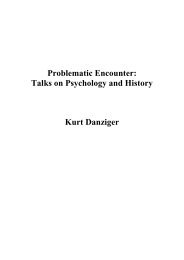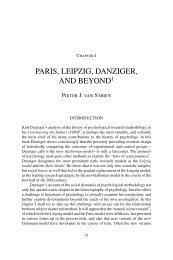The positivist repudiation of Wundt - Kurt Danziger
The positivist repudiation of Wundt - Kurt Danziger
The positivist repudiation of Wundt - Kurt Danziger
Create successful ePaper yourself
Turn your PDF publications into a flip-book with our unique Google optimized e-Paper software.
THE POSITIVIST REPUDIATION OF WUNDT<br />
For a <strong>positivist</strong> psychology, the <strong>Wundt</strong>ian doctrine <strong>of</strong> apperception was clearly un-<br />
acceptable. Ins<strong>of</strong>ar as it postulated a psychological force or agency it smacked <strong>of</strong><br />
metaphysics and was incompatible with the Machian view <strong>of</strong> science. Kiilpe’s Outlines <strong>of</strong><br />
1893, which so carefully avoided an open break with <strong>Wundt</strong>, eventually worked up to a<br />
rejection <strong>of</strong> the latter’s central idea that active apperception involved a psychological<br />
principle quite different from mere association: “But we can discover no good reason for<br />
regarding it [i.e., active apperception] as a really new form <strong>of</strong> connection, as incapable <strong>of</strong><br />
subsumption (at least in principle) to the familiar laws <strong>of</strong> reproduction.” 49 Kiilpe did not<br />
deny the observations that had led to the theory <strong>of</strong> apperception, but he felt (at least in<br />
his Machian phase) that any central selective process could be accounted for by the<br />
effects <strong>of</strong> past association without requiring the introduction <strong>of</strong> a new principle <strong>of</strong> psy-<br />
chological activity.<br />
Ebbinghaus adopted a similar position. He admitted that the phenomenon <strong>of</strong> atten-<br />
tion was “a regular embarrassment for psychology,” but he rejected <strong>Wundt</strong>’s volun-<br />
taristic theory <strong>of</strong> apperception as an unscientific attempt to cope with the problem. He<br />
preferred to regard the observed effects <strong>of</strong> the central selecting mechanism as a product<br />
<strong>of</strong> separate, precisely determinable factors rather than as the expression <strong>of</strong> a single cen-<br />
tral process which seemed to him to imply the activity <strong>of</strong> some kind <strong>of</strong> homunculus.50 He<br />
also objected to <strong>Wundt</strong>’s formulation on heuristic grounds, for the assumption <strong>of</strong> un-<br />
derlying causal processes makes <strong>Wundt</strong>’s formulations cumbersome without constituting<br />
an aid to empirical observation. In this respect Ebbinghaus followed a crucial maxim <strong>of</strong><br />
the Machian philosophy <strong>of</strong> science, the principle <strong>of</strong> economy. Scientific theories, being<br />
simply summaries <strong>of</strong> observations and practical guides to further experimentation, can<br />
serve their tasks best by being kept simple and avoiding the introduction <strong>of</strong> additional<br />
concepts. It was no doubt Ebbinghaus’s commitment to this principle that led him to<br />
eliminate the category <strong>of</strong> “choice” as a criterion for identifying a new kind <strong>of</strong> central<br />
process. For Ebbinghaus, therefore, the determinants <strong>of</strong> voluntary attention were con-<br />
stituted by the sum <strong>of</strong> existing specific reproductive tendencies, whereas <strong>Wundt</strong>’s theory<br />
<strong>of</strong> apperception had sought to express the conviction that the central process involved in<br />
choice behavior was irreducible to any combination <strong>of</strong> specific action tendencies but in-<br />
volved the emergence <strong>of</strong> a new level <strong>of</strong> functioning.<br />
<strong>The</strong> <strong>Wundt</strong>ian theory <strong>of</strong> apperception proved more <strong>of</strong> a problem for Titchener than<br />
it did for Ebbinghaus who had no interest in trading on <strong>Wundt</strong>’s reputation. Although he<br />
could not accept <strong>Wundt</strong>’s philosophy <strong>of</strong> science, Titchener obviously derived great<br />
satisfaction from playing the role <strong>of</strong> <strong>Wundt</strong>’s disciple in psychology. His way <strong>of</strong> resolving<br />
the ambiguity <strong>of</strong> this position was to subject <strong>Wundt</strong>’s theories to a systematic reinter-<br />
pretation so as to remove or trivialize their basic incompatibility with the classical British<br />
tradition in psychology and with Titchener’s Machian philosophy <strong>of</strong> science. While a<br />
systematic comparison <strong>of</strong> Titchener’s <strong>Wundt</strong> with <strong>Wundt</strong>’s <strong>Wundt</strong> would be tangential<br />
to the present discussion, certain themes are worthy <strong>of</strong> note. In particular, it is clear that<br />
Titchener did not find the core <strong>of</strong> <strong>Wundt</strong>’s voluntaristic apperception theory, the notion<br />
<strong>of</strong> a centrally acting “psychic causality,” any more palatable than did the early Kiilpe,<br />
Ebbinghaus, or Meumann. Titchener’s characteristic attitude emerged early. In 1894<br />
Walter Pillsbury was working on a doctoral thesis under Titchener in the area <strong>of</strong><br />
apperception. He recollects that they decided to replace <strong>Wundt</strong>’s concept <strong>of</strong> apperception<br />
as “an active force” with a different usage by which apperception became “the name for<br />
an observed interaction and not for a force. <strong>The</strong> suggestion was made that <strong>Wundt</strong> could<br />
be interpreted to mean something <strong>of</strong> this kind and used apperception as the equivalent <strong>of</strong><br />
217





